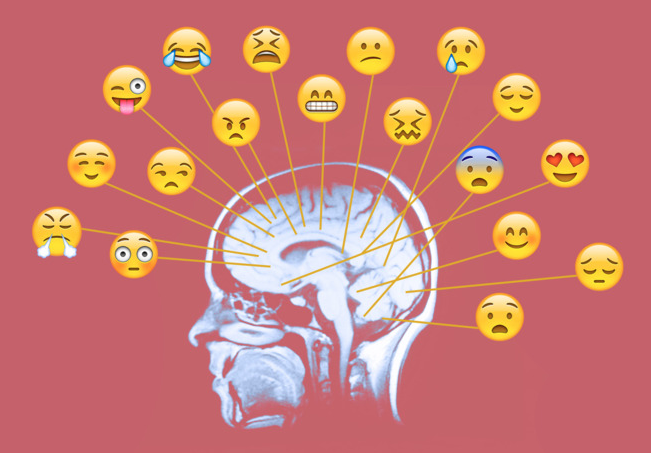Vegetable. Vegetable vegetable vegetable vegetable vegetable.
蔬菜。蔬菜,蔬菜,蔬菜,蔬菜,蔬菜,蔬菜,蔬菜。
Don't worry, I'm not trying to brainwash you into eating your veggies or anything.
別擔(dān)心,我不是想給你洗腦,讓你吃蔬菜什么的。
I'm trying to induce semantic satiation: that thing where if you repeat something enough times, it starts to lose all meaning.
我在試著去誘導(dǎo)語(yǔ)義飽和:如果你重復(fù)某件東西的次數(shù)足夠多,就會(huì)失去東西的全部意義。
Sure, maybe that's not the most productive way to spend my time — but!
當(dāng)然,也許這不是最有效的消磨時(shí)間的方式——但是!
This effect can tell you a whole lot about how your brain reacts when you ask it to process the same thing over and over and over and over…
當(dāng)你要求大腦反復(fù)處理同一件事情時(shí),此效應(yīng)可以告訴你很多關(guān)于大腦如何反應(yīng)的信息......
Semantic satiation was first reported in academic literature in the early 1900s by British psychologist
20世紀(jì)初,英國(guó)心理學(xué)家首次在學(xué)術(shù)文獻(xiàn)中提出語(yǔ)義飽和
Edward Titchener. He described losing the meaning of a word as puzzling and a morsel frightening, which is a very 1900s way of putting it,
愛德華·蒂奇納把失去一個(gè)單詞的意思描述為令人困惑和害怕,這是20世紀(jì)的一種說(shuō)法,
but is also pretty accurate. It is kind of scary when a word you use all the time suddenly seems foreign and strange.
但也頗為準(zhǔn)確。當(dāng)一個(gè)你經(jīng)常使用的單詞突然變得陌生時(shí),你會(huì)覺得有點(diǎn)害怕。
Soon, psychologists started studying the effect through case studies and smaller experiments.
不久,心理學(xué)家開始通過案例和較小的實(shí)驗(yàn)來(lái)研究這種效應(yīng)。
But it wasn't until more recently that we really started to get an idea of what causes it.
但直到最近,我們才真正開始了解它的成因。
So, why does the meaning of repeated words just ... slip right out of your head?
那么,為什么重復(fù)單詞,而單詞的意思會(huì)從你腦子里溜走?
Well, every time you say the word "vegetable", you activate the associated node –
每次說(shuō)“蔬菜”這個(gè)詞,相關(guān)的節(jié)點(diǎn)——
the area of your brain responsible for storing the concept of what a vegetable is.
大腦中負(fù)責(zé)儲(chǔ)存蔬菜概念的區(qū)域就會(huì)被激活。
And when you repeat the word, you activate the node again and again.
當(dāng)你重復(fù)這個(gè)詞的時(shí)候,你會(huì)一次又一次的激活這個(gè)節(jié)點(diǎn)。
Asking that node to activate so many times in just a few seconds is kind of like asking your brain to sprint really hard and just...keep… going.
幾秒鐘內(nèi)那個(gè)節(jié)點(diǎn)被多次激活就像讓你的大腦拼命沖刺……保持……。
It might start off well, but after a while the node gets fatigued,
一開始可能很好,但過了一段時(shí)間節(jié)點(diǎn)就會(huì)疲勞,
and every activation that you force by saying the word vegetable yet again is that much harder to make happen.
每次說(shuō)出“蔬菜”這個(gè)詞,激活都很難實(shí)現(xiàn)。
When a node gets tired like that, it's called reactive inhibition, and that's where the "satiation" in semantic satiation comes from.
當(dāng)一個(gè)節(jié)點(diǎn)累了,我們稱之為反應(yīng)性抑制,這就是語(yǔ)義飽和中“飽和”的來(lái)源。
While that node is inhibited, you can't use it to draw meaning out of the word "vegetable" until it recovers.
當(dāng)這個(gè)節(jié)點(diǎn)被抑制,你無(wú)法用其提取“蔬菜”這個(gè)詞的意思,直至節(jié)點(diǎn)恢復(fù)。
Even weirder, because of this node arrangement, when you satiate one word,
更奇怪的是,由于這個(gè)節(jié)點(diǎn)的排列,當(dāng)你飽和重復(fù)一個(gè)單詞,
it can also become harder to draw meaning from other related words and concepts.
從其他相關(guān)的單詞和概念中提取意思也會(huì)變得更加困難。
A great example of this comes from research published back in 1990:
一個(gè)典型例子是1990年發(fā)表的研究:
Participants were asked to satiate a word that represented a category, like the word "furniture", by repeating it 30 times.
參與者被要求重復(fù)一個(gè)代表類別的詞30次,比如“家具”。

Then they were presented with two related words, like "chair" and "table",
然后是兩個(gè)相關(guān)的詞,如“椅子”和“桌子”,
and asked to identify whether the words belonged to the same category as each other.
并確定這些詞是否屬于同一類別。
Even though they weren't directly analyzing the word "furniture",
盡管他們沒有直接分析“家具”這個(gè)詞,
subjects who'd repeated it 30 times were slower to identify whether or not the two words were related
重復(fù)30次后,受試者判斷這兩個(gè)詞是否相關(guān)的速度就會(huì)變慢
— probably because they had a harder time accessing the meaning of things related to furniture.
——可能是因?yàn)樗麄兒茈y理解與家具相關(guān)事物的含義。
People in the control group, who only repeated "furniture" 3 times, didn't have those problems.
對(duì)照組只重復(fù)“家具”三次,沒有出現(xiàn)這些問題。
Their furniture node wasn't tired out, so they could access the meanings of related words just fine.
他們的“家具”節(jié)點(diǎn)并沒有累壞,所以他們可以很好地獲取相關(guān)單詞的含義。
So if you repeat the word "vegetable" enough times, you might also have trouble processing the word "carrot" or "pepper".
因此,如果你重復(fù)“蔬菜”這個(gè)詞的次數(shù)足夠多,你可能在處理“胡蘿卜”或“胡椒”時(shí)有困難。
But satiation can affect more than just words.
但飽和不僅僅影響語(yǔ)言。
Other studies have shown that satiating emotional words,
其他研究表明,飽和重復(fù)一些感情詞,
like "happiness" or "anger" can impair your ability to recognize those emotions in facial expressions for a while.
比如“快樂”或“憤怒”,一段時(shí)間內(nèi)會(huì)削弱你在面部表情中識(shí)別這些情緒的能力。
In one study from 2012, for example, 60 college students looked at a set of faces until they were familiar with them.
例如,在2012年的一項(xiàng)研究中,60名大學(xué)生看著一組面孔,直至熟悉為止。
Then they were divided into a control and an experimental group.
然后將它們分成對(duì)照組和實(shí)驗(yàn)組。
At the beginning of each trial, they were asked to repeat the word for an emotion, like "happiness".
每次試驗(yàn)開始的時(shí)候,他們都被要求重復(fù)“快樂”這個(gè)詞。
The control group only repeated the word 3 times, but the experimental group repeated it 30 times,
對(duì)照組只重復(fù)單詞3次,實(shí)驗(yàn)組重復(fù)單詞30次,
taking them firmly into semantic satiation territory.
將它們穩(wěn)穩(wěn)地進(jìn)入語(yǔ)義飽和狀態(tài)。
Both groups were then shown a face displaying that emotion —
然后,給兩組人展示表情
so if they'd been repeating the word "happiness", the researchers would show them a happy face.
所以如果他們一直重復(fù)“快樂”這個(gè)詞,研究人員就會(huì)給他們看一張快樂的臉。
After a pause, they'd show them two versions of that happy face. One would be slightly happy, and one would be very happy.
停了一會(huì)兒,研究人員給他們看兩張不同的笑臉,一個(gè)人有點(diǎn)快樂,一個(gè)人很快樂。
Think a "Huh, I look great today" face versus an "Oh my gosh, we're getting a puppy?!" face.
想想看,一張“哈,我今天看起來(lái)棒極了”的臉,另一張“天哪,我們要養(yǎng)只小狗了?!”的臉。
One of those two pictures matched the first one the subjects saw, and they had to identify the matching one.
這兩張圖片中的其中一張與實(shí)驗(yàn)看到的第一張相匹配,他們必須識(shí)別出相匹配的那張。
And the experimental group who'd repeated emotional words 30 times took longer to identify the matching picture.
而實(shí)驗(yàn)組重復(fù)了30次感情詞的人識(shí)別匹配圖片的時(shí)間更長(zhǎng)。
Repeating words like "happiness", "fear", and "anger" made it harder for them to access the entire concept of that emotion—
重復(fù)像“快樂”、“恐懼”和“憤怒”這樣的詞會(huì)讓他們理解那種情緒概念——
including what it looks like as a facial expression.
包括面部表情更加困難。
So, the next time you're trying to cram for a quiz by repeating all those new words you've gotta learn, just remember that your brain has limits.
所以,下次你想死記硬背那些你必須學(xué)習(xí)的新單詞時(shí),記住你的大腦是有極限的。
Maybe let it take a breather in between rehearsing words over and over and over and over.
不妨在一遍又一遍記單詞中間休息一下。
And if the word "vegetable" is starting to sound as weird to you as it is to me, well… at least our brains are getting confused together.
如果“蔬菜”這個(gè)詞對(duì)你和對(duì)我來(lái)說(shuō)聽起來(lái)都很奇怪,那么……至少我們的大腦開始糊涂了。
Thanks for watching this episode of Scishow Psych, and a big thank you to our patrons on Patreon who made it possible.
感謝收看本集心理科學(xué)秀,感謝Patreon為我們的節(jié)目提供贊助。
If you liked it, feel free to give us a thumbs up, and if you want to keep exploring psychology with us, hit that subscribe button. Until next time!
如果你喜歡我們的節(jié)目,請(qǐng)給我們點(diǎn)贊,如果你想和我們一起探索心理學(xué),點(diǎn)擊訂閱按鈕。我們下次再見!


